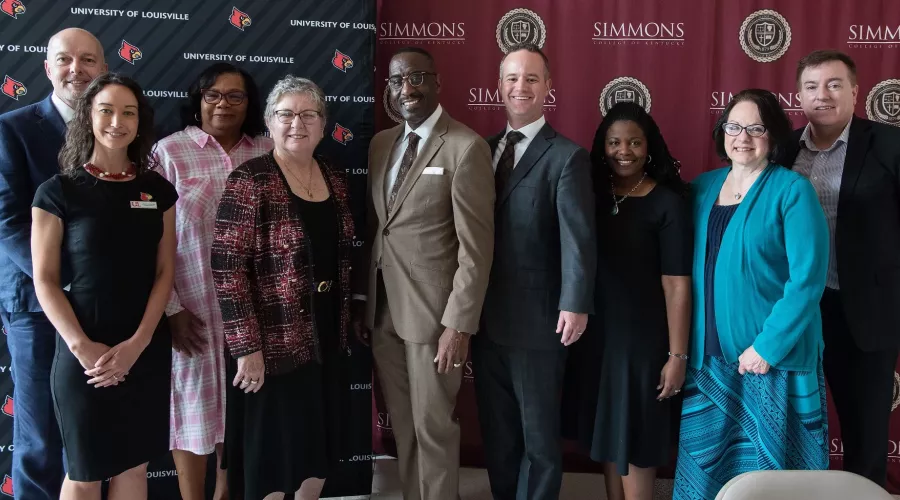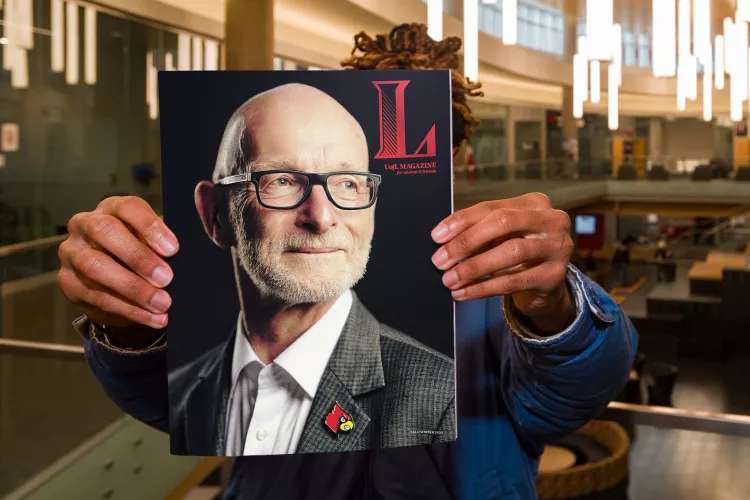UofL and Simmons College partner on healthy neighborhoods project
October 2, 2024
Researchers embarking on a project to understand what factors contribute to a Universal Basic Neighborhood
What characteristics of a neighborhood contribute to the health of its residents – or reduce it?
The University of Louisville and Simmons College of Kentucky are embarking on a new project to answer that question and discover how changing a place can improve the health of its residents. A $500,000 grant from the Robert Wood Johnson Foundation will fund an 18-month study to identify the features all neighborhoods should have in order to promote the health of all residents.
Researchers from Simmons’ Reverend Jesse Louis Jackson, Sr. Center for Racial Justice and UofL’s Christina Lee Brown Envirome Institute, along with urban studies expert Michael Emerson of Rice University and legal scholar Shavonnie Carthens of the University of Kentucky, will survey residents of two Louisville neighborhoods, review existing data on environmental factors that affect health and consider legal aspects of neighborhood development, all with the goal of defining a “universal basic neighborhood” (UBN). A universal basic neighborhood is one that has all the necessary community assets that help residents thrive in their place.
The most recent Health Equity Report from the Louisville Metro Department of Public Health and Wellness, published in 2017, highlights stark differences in morbidity and mortality of those living in different neighborhoods across the city. For example, in Louisville’s predominantly Black communities, life expectancy is as much as 12.6 years less than in the most affluent, predominantly white communities. Black babies born from 2011-2015 have a death rate 1.95 times higher than the Louisville Metro average and 2.31 times higher than white babies. Diabetes, heart disease and cancer rates vary by location, race and income.
“We live in one of the wealthiest countries in the world and we still have places where living conditions contribute to diseases that are entirely preventable,” said Ted Smith, director of the UofL Center for Healthy Air, Water and Soil, part of the Envirome Institute. “This work is about diagnosing and treating places so that the health benefits are shared by many.”
Most existing efforts to address health inequities focus on providing health resources to eligible individuals. This study instead looks for ways to improve health at the neighborhood level by providing resources that make it easier for residents to make healthy choices.
“Neighborhoods, no matter where they are, are not inherently bad or good. They're just neighborhoods. However, one thing that makes neighborhoods different from each other is access to health-supportive resources,” said Nancy Seay, chair of the James R. L. Diggs Department of Sociology at Simmons. “We know that every neighborhood has a rich fabric of local resources that residents access, and we want to uncover these and promote their utilization. Everyone, no matter where they live, wants and deserves to enjoy good health and a long life. This project can be a game changer for the way we think about designing and supporting neighborhoods and their residents.”
The scope of the research
The research team, led by Seay and Smith, will assemble evidence for place-based factors that are associated with good health, identify and map assets in two demographically distinct Louisville neighborhoods, examine the history of civic investment in Louisville and determine how to develop and implement city policy that supports health.
In the same vein as historic efforts to ensure clean drinking water and waste removal for entire communities, the UBN project will assess and rank factors that contribute to longer, healthier lives, such as opportunities for exercise and recreation, greenness and access to healthy food and transportation. This project approaches health equity with the idea that it is more efficient to invest in resources that benefit the health of all residents of underserved neighborhoods than in health interventions for individuals.
In the first stage of the project, set to start in September, Seay will lead work to map assets of Louisville’s Crescent Hill and California neighborhoods. Students in her Participatory Action Research class at Simmons will conduct door-to-door surveys, interviews and focus groups in those neighborhoods to reveal how residents of those communities find good health, what aspects of their environment they believe contribute to health and how empowered they feel to make changes. They also hope to identify important assets related to the specific interests and culture of those living in the neighborhoods that have not been studied previously. UofL students also may take the class through a reciprocal agreement with Simmons.
At UofL, Smith will lead a review of published studies that can help justify components of a UBN and provide criteria for weighting those components. Factors evaluated will include those that contribute to disease and those that promote health, such as access to parks, forms of transit and the variety of educational, recreational and entertainment venues.
Carthens, a legal scholar at the UK’s J. David Rosenberg College of Law and formerly at UofL’s Brandeis School of Law, will delve into the deep drivers of policies that must be reformed in order to achieve an optimal neighborhood environment. She will identify the legal framework required to support the public provision of a UBN and sectors of society best positioned to provide these resources.
The project also includes Emerson, Chavanne Fellow in Religion and Public Policy at Rice University’s Baker Institute and co-founder of Rice’s Kinder Institute for Urban Research.
At the project’s completion, the team expects to have a "playbook" that will assist communities in defining their own neighborhood needs and outline steps toward implementing the plan.
For more information:
Residents of the California and Crescent Hill neighborhoods who are interested in participating in surveys or focus group interviews for the project may contact Patricia Reeves at patricia.reeves@simmonscollegeky.edu
Community Partners who are interested in learning more about the project and opportunities for collaboration may contact Lauren Anderson at lauren.anderson@louisville.edu.
Project updates will be shared on social media at Simmons College and the Christina Lee Brown Envirome Institute.
Betty Coffman is a communications coordinator focused on research and innovation at UofL. A UofL alumna and Louisville native, she served as a writer and editor for local and national publications and as an account services coordinator and copywriter for marketing and design firms prior to joining UofL’s Office of Communications and Marketing.
Related News



